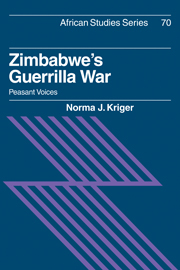Book contents
- Frontmatter
- Contents
- List of maps
- Acknowledgements
- Introduction
- 1 Peasant revolutions: theories and methods
- 2 Inequalities and peasant grievances
- 3 Strategies, goals and appeals: continuity and change
- 4 Guerrilla–civilian relations: the issue of popular support
- 5 Struggles in the struggle
- 6 Legacies of the war for peasants
- 7 Conclusion
- Appendix: Field research
- Notes
- Bibliography
- Index
- Other books in the series
7 - Conclusion
Published online by Cambridge University Press: 05 January 2012
- Frontmatter
- Contents
- List of maps
- Acknowledgements
- Introduction
- 1 Peasant revolutions: theories and methods
- 2 Inequalities and peasant grievances
- 3 Strategies, goals and appeals: continuity and change
- 4 Guerrilla–civilian relations: the issue of popular support
- 5 Struggles in the struggle
- 6 Legacies of the war for peasants
- 7 Conclusion
- Appendix: Field research
- Notes
- Bibliography
- Index
- Other books in the series
Summary
I began by posing the following questions. How do revolutionary organizations win popular support, what is the evidence for popular support, and how satisfactory is it? Who in the peasantry is most likely to participate in revolutions? What motivates peasants to participate in revolutions? And what are the outcomes for peasants from participating in revolutionary movements? Influential studies of peasant revolution were selected to examine how they approached these questions, and the first chapter pays particular attention to their methodologies and concepts. I also analyze how the literature on ZANU's guerrilla war answers these questions, and how its concepts and methods influence its findings. Using alternative concepts and methods, I reinterpret ZANU's guerrilla war from the perspectives of peasants in Mutoko district. A basic premise of this book, like others that make mobilization a topic of investigation, is that individual choice has an important influence on political outcomes. In this assumption, it differs from studies that downplay or dismiss the role of human agency in affecting outcomes. Such alternative studies are more likely to highlight how structures inhibit individual choice and action and to focus on the causes and consequences of revolutions rather than their processes. The findings of this book, despite its different initial assumption from structural analyses, illuminate the significance of structures, particularly the structure of the state and of peasant communities.
- Type
- Chapter
- Information
- Zimbabwe's Guerrilla WarPeasant Voices, pp. 237 - 242Publisher: Cambridge University PressPrint publication year: 1991

